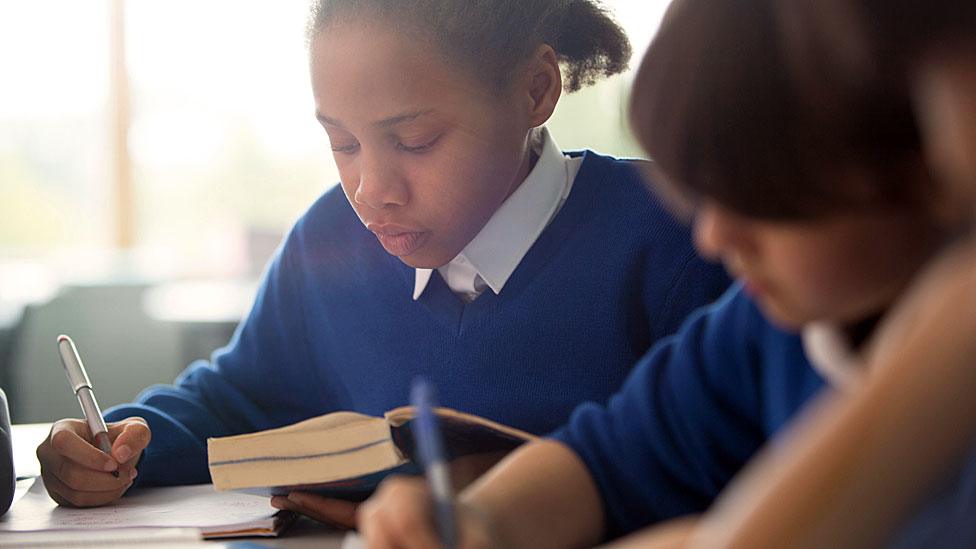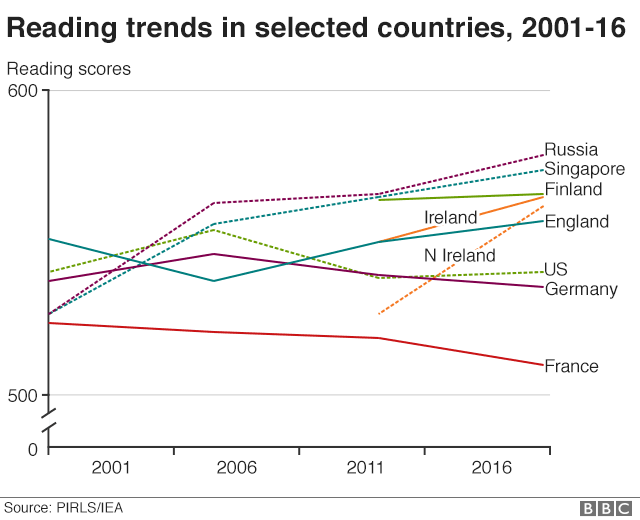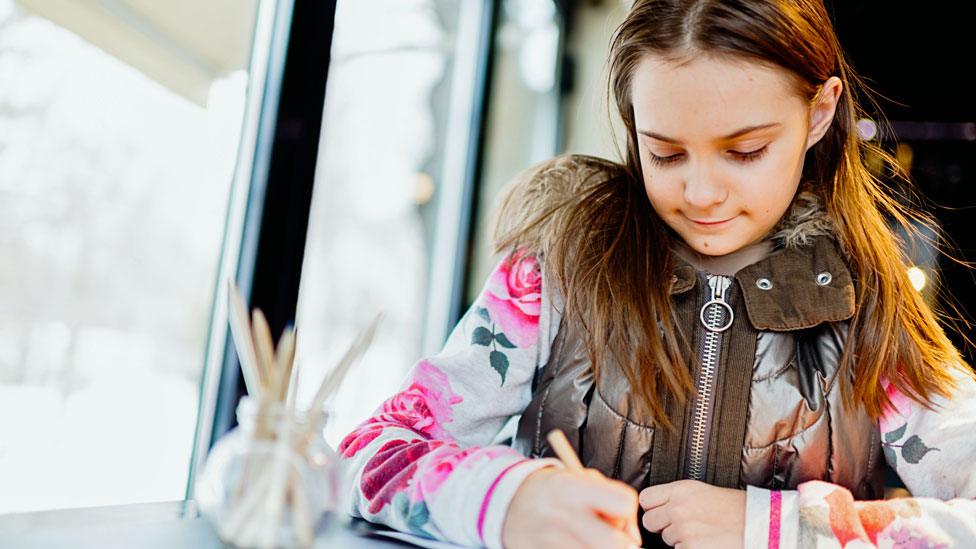Northern Ireland and England schools in global top 10 for reading
- Published
- comments

Almost 320,000 pupils took the tests, with girls ahead in almost every country
Northern Ireland and England are in the top 10 of the world's best primary school readers in global rankings.
The Progress in International Reading Literacy Study - known as PIRLS - shows Northern Ireland in joint sixth place, with England in joint eighth.
Both Northern Ireland and England have reached their highest point scores in reading tests taken in 50 countries.
Russia takes the top place in this international education league table, based on tests taken every five years.
The Republic of Ireland, in fourth, is second only to Russia among European countries.
Girls are ahead of boys in almost every country taking the tests.
Geoff Barton, leader of the ASCL head teachers' union, praised the work of schools in England and Northern Ireland and said the results reflected "the huge focus that schools have placed on the teaching of reading over the course of many years".
International competition
The tests taken by almost 320,000 10-year-olds around the world, show Northern Ireland's pupils as among the highest achievers, ranked joint sixth with Poland.
The result puts them only marginally behind long-standing high achievers such as Finland.
"I like reading because I get smarter and smarter" - here's what the kids make of it all
With the Northern Ireland assembly still suspended, there is no current education minister, but Northern Ireland's education department pointed to the success of a "Count, Read: Succeed" strategy, external introduced in 2011 with targets to improve literacy and numeracy.
There are no Sats tests for 11-year-olds in Northern Ireland, but pupils in the last year of primary can take transfer tests for grammar schools. It's also a system in which many places are allocated on the basis of religious faith.
The National Foundation for Educational Research, which administered the tests in Northern Ireland, says families and local communities seemed to put a "high value on academic success".
Senior research manager Juliet Sizmur said the international comparison suggested that reading was particularly valued in Northern Ireland.

England was ranked joint eighth, alongside Norway and Taiwan, and England's school standards minister Nick Gibb hailed the positive impact of the phonics system of learning to read.
"Our rise through the global rankings is even more commendable because it has been driven by an increase in the number of low-performing pupils reading well," said Mr Gibb.
This is a much higher ranking than in the international Pisa tests for secondary school pupils, run by the OECD, in which England is not in the top 20 for reading or maths.
Scotland and Wales did not take part in these latest PIRLS tests.
Top 10 for primary reading
1. Russia
2. Singapore
3. Hong Kong
4. Republic of Ireland
5. Finland
6. Poland
= Northern Ireland
8. Norway
= Taiwan
= England
Comparisons with the last rankings from five years ago depend on which measures are used, says the International Association for the Evaluation of Educational Achievement (IEA), which runs the PIRLS tests with Boston College in the US.
The Netherlands-based IEA says that this year England is 10th, but because "there is no statistical significant difference" with two countries above, they are effectively joint eighth.
Five years ago, the IEA says England was ranked 11th, but as there was no statistical significant difference with US, Denmark, Croatia, Chinese Taipei, and Ireland this "could be interpreted as a joint sixth ranking".
Girls ahead of boys
The IEA's executive director, Dirk Hastedt, says that Russia's success reflects a series of education reforms and a "lot of emphasis on academic excellence" and much more rigour over standards.
Dr Hastedt says such tests reveal international trends in education.
Girls are ahead of boys in almost every country taking the tests, says Dr Hastedt.
He says there are increasing numbers of children in pre-school education - and this seems to be linked to higher performance.

Pupils in Russia were the highest achieving in this global test
There are also signs that parents are more likely to get involved in helping their children's learning.
The national comparisons are based on representative samples of pupils, designed by researchers to reflect different regions and types of school.
In England, there were about 5,000 pupils taking the tests last year, drawn from 170 schools. In Russia, the sample was based on about 4,600 pupils in 206 schools.
Most of the pupils taking the tests were aged about 10 - but there were differences depending on the sample.
In Russia and Finland, the average of those taking the tests was 10.8 years, a year older than the average age of those taking the test in Italy and France.
Michael Martin, executive director of the TIMSS and PIRLS International Study Center at Boston College, says that this year's results showed the importance of early years education and parental interest.
"Children whose parents had engaged them in literacy activities - reading books or playing word games - from an early age are better equipped with basic reading skills when they begin primary schools and go on to have higher reading achievements," said Prof Martin.